ADHD
It Happened to Me
Series Editor: Arlene Hirschfelder
Books in the It Happened to Me series are designed for inquisitive teens digging for answers about social issues, certain illnesses, or lifestyle interests. These books feature up-to-date information, relatable teen views, and thoughtful suggestions to help you figure out stuff. Besides special boxes that highlight singular facts, each book is enhanced with the latest reading lists, websites, and other recommendations.
The following titles may also be of interest:
Activism: The Ultimate Teen Guide , by Kathlyn Gay
ADHD: The Ultimate Teen Guide , by John Aspromonte
Autism Spectrum Disorder: The Ultimate Teen Guide , by Francis Tabone
Bigotry and Intolerance: The Ultimate Teen Guide , by Kathlyn Gay
Bullying: The Ultimate Teen Guide , by Mathangi Subramanian
Chronic Illnesses, Syndromes, and Rare Disorders: The Ultimate Teen Guide , by Marlene Targ Brill
Creativity: The Ultimate Teen Guide , by Aryna M. Ryan
Depression: The Ultimate Teen Guide , by Tina P. Schwartz
Eating Disorders: The Ultimate Teen Guide , by Jessica R. Greene
Epilepsy: The Ultimate Teen Guide, 2nd Edition , by Kathlyn Gay
Food Allergies: The Ultimate Teen Guide , by Jessica Reino
Self-Injury: The Ultimate Teen Guide , by Judy Dodge Cummings
Sexual Decisions: The Ultimate Teen Guide, 2nd Edition , by L. Kris Gowen
Shyness: The Ultimate Teen Guide , by Bernardo J. Carducci, PhD, and Lisa Kaiser
Social Networking: The Ultimate Teen Guide , by Jenna Obee
Speech and Language Challenges: The Ultimate Teen Guide , by Marlene Targ Brill
Substance Abuse: The Ultimate Teen Guide , by Sheri Bestor
ADHD
The Ultimate Teen Guide
John Aspromonte
It Happened to Me, No. 58
ROWMAN & LITTLEFIELD
Lanham Boulder New York London
Published by Rowman & Littlefield
An imprint of The Rowman & Littlefield Publishing Group, Inc.
4501 Forbes Boulevard, Suite 200, Lanham, Maryland 20706
www.rowman.com
Unit A, Whitacre Mews, 26-34 Stannary Street, London SE11 4AB
Copyright 2019 by The Rowman & Littlefield Publishing Group, Inc.
All rights reserved . No part of this book may be reproduced in any form or by any electronic or mechanical means, including information storage and retrieval systems, without written permission from the publisher, except by a reviewer who may quote passages in a review.
British Library Cataloguing in Publication Information Available
Library of Congress Cataloging-in-Publication Data
Names: Aspromonte, John, 1977 author.
Title: ADHD : the ultimate teen guide / John Aspromonte.
Description: Lanham : Rowman & Littlefield, [2019] | Series: It happened to me ; no. 58 | Includes bibliographical references and index.
Identifiers: LCCN 2018024321 (print) | LCCN 2018037501 (ebook) | ISBN 9781538100394 (electronic) | ISBN 9781538100387 (cloth : alk. paper)
Subjects: LCSH: Attention-deficit disorder in adolescence. | Attention-deficit disorder in adolescenceSocial aspects. | Attention-deficit disorder in adolescenceTreatment. | TeenagersLife skills guides.
Classification: LCC RJ506.H9 (ebook) | LCC RJ506.H9 A87 2019 (print) | DDC 616.85/8900835dc23
LC record available at https://lccn.loc.gov/2018024321
 The paper used in this publication meets the minimum requirements of American National Standard for Information SciencesPermanence of Paper for Printed Library Materials, ANSI/NISO Z39.48-1992.
The paper used in this publication meets the minimum requirements of American National Standard for Information SciencesPermanence of Paper for Printed Library Materials, ANSI/NISO Z39.48-1992.
Printed in the United States of America
To everyone who struggles with,
or knows someone who struggles with,
ADHD.
With knowledge, persistence, and a sense of humor,
you can find the key to your success.
Acknowledgments
I would like to acknowledge my wife, Bernadett, who is not only the author of chapter 4 but also the coauthor of my life. Her valuable insights, knowledge, and guidance were an integral part of this book.
I would also like to acknowledge my son, John. I am so proud to be your dad.
To Mom and Jerry, your support is immeasurable.
I would also like to acknowledge the many educators, researchers, and clinicians who have helped me forge my path over the years.
Introduction
W hen I mention the term attention-deficit/hyperactivity disorder , what comes to mind? Maybe you think of someone who is always zoning out or someone with boundless energy, or maybe you think of someone who always says whats on his or her mind. Maybe that term makes you think of a person who has a great sense of humor or is very creative. Perhaps you dont even think you know anyone with ADHD. There is a good chance that the term ADHD means different things to different people. Within ADHD is a collection of behaviors that we all may have experienced at one time or another, either in ourselves or in someone else. Did you know that up to 5 percent of schoolchildren in the United States have ADHD? That is a lot of people. As a student, this means that there is a good chance someone in your class has ADHD, maybe even you. ADHD has become a commonly referred-to disorder and a household name, but many people still have questions about what exactly ADHD is and how it can affect us.
True or false: ADHD is a simple problem of being hyperactive and not listening when someone is talking to you. False! ADHD is a complex disorder that involves impairments in focus, organization, motivation, emotion, memory, and other functions of the brains management system. In addition, ADHD can affect schoolwork, social life, family life, and the way you feel about things. Learning the facts about ADHD and busting many of the common myths that people believe are important if you want to understand and live with ADHD successfully.
The purpose of this book is to provide the definition of and information about ADHD and its effect on school, family, and social life. This book is for anyone who wants to learn factual information about ADHD and also hear about the difficulties and successes of other young people who have ADHD. Along the way we will explore what students like you think about ADHD and learn where to go to find information and communities of people who are dedicated to the study of it.
The History of ADHD
A diagnosis is a collection of symptoms, behaviors, or patterns that doctors and scientists agree on. Throughout history people have had inattention, hyperactivity, and impulsivity, but attention-deficit/hyperactivity disorder did not get its name until 1987. That year the Diagnostic and Statistical Manual , third edition, was revised and released. Before 1987 ADHD was known as attention deficit disorder (no hyperactivity in the name). Before 1980 it was known as hyperkinetic reaction of childhood . Before 1968 it was known as minimal brain dysfunction and prior to that minimal brain damage . It is important to realize that ADHD has changed over the years and so has our definition.
One way to think about this is if we compare ADHD to a country whose name and borders have changed over the years. Did you know that before Alaska was a US state it was owned by Russia? It was purchased by the United States in 1867 and became a state in 1959. Although Alaska was part of a different country, the natural inhabitants of Alaska still remain the same. Maybe the borders have changed a little but the central core is the same and many still speak the same language. ADHD is similar. Its name and some of the behaviors that define it have changed, but the core symptoms have stayed the same. Some people may think that because the name ADHD did not exist thirty years ago, there was no such thing as ADHD. This would be like saying that there was no such thing as cancer or diabetes before the name existed in medical books. As our understanding of science gets better, so does our understanding of ADHD.
Next page

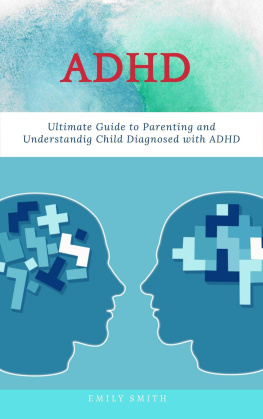

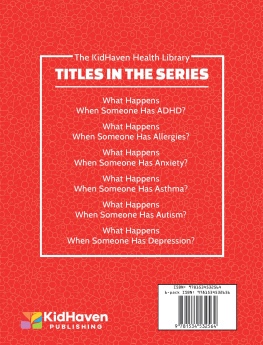

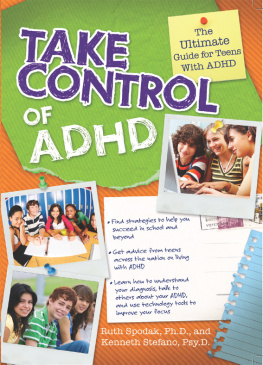
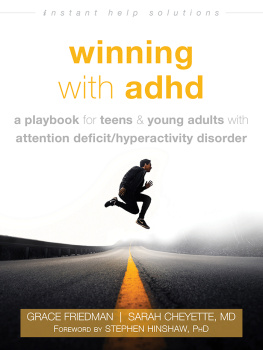
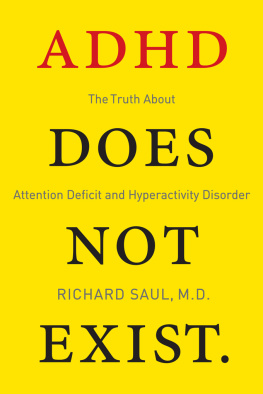
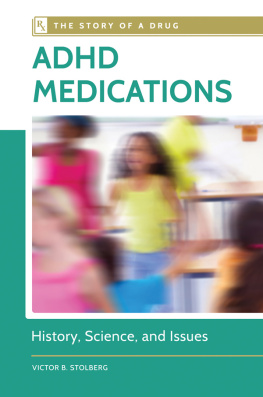
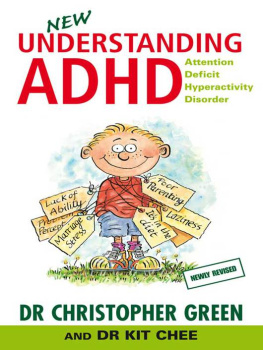
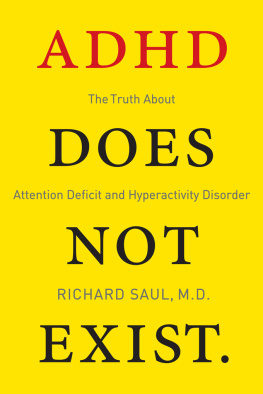
 The paper used in this publication meets the minimum requirements of American National Standard for Information SciencesPermanence of Paper for Printed Library Materials, ANSI/NISO Z39.48-1992.
The paper used in this publication meets the minimum requirements of American National Standard for Information SciencesPermanence of Paper for Printed Library Materials, ANSI/NISO Z39.48-1992.